Feedback
Feedback is a fundamental concept in fractals and chaos theory and the world in general.
Feedback is what keeps complex systems stable. But - feedback can also cause things
to change abruptly and unpredictably!
In mathematics, feedback is the process of iteration, where we take the answer from
an equation and plug it back in again and calculate a new answer. In the natural world feedback comes in many varieties and serves many important functions. In essence,
feedback involves taking the output of a system and feeding it back in to the input, making a loop.
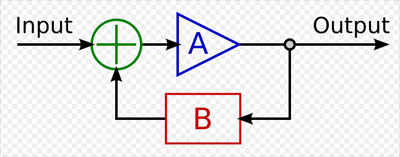
A generalized feedback system, where a signal enters the system, A, producing an output,
some of which is fed back into the input through B. If B increases the signal,
it is positive feedback, if it decreases the signal, it is negative feedback.
We will explore the two main types of this phenomenon: positive feedback and negative feedback, in a range of systems, and see examples of the fractals they create.
In general, positive feedback amplifies a signal, and it can do so dramatically. This kind of feedback can easily get out of control, and is responsible for fires, explosions,
and the shrieking of rock guitars through their amplifiers.
Negative feedback, by contrast, serves to regulate and keep systems in balance. A common example is a thermostat, which is a device to keep the temperature at a set point.
When the temperature (the signal) drops below that point, it turns on the furnace, heating up the house until it is warm enough that the thermostat turns off the heater
There are many examples of feedback influenced systems. Sometimes they exhibit positive feedback, sometimes negative feedback, and sometimes both.

|
Fire, explosions, even nuclear reactions (both in reactors and in weapons) are all positive feedback driven chain reactions. A single match can start a forest fire.
|

|

|
The melting of the polar icecaps is driven by an accelerating positive feedback loop. When the ice melts, the color of the water is darker,
which absorbs more sunlight, which heats and melts more ice, which absorbs more sunlight...
|

|

|
Predator-Prey relationships keep ecosystems in balance. When the population of rabbits rises, it is followed by a rise in the number of
coyotes, which drives down the number of rabbits. If the coyotes eat too many rabbits, then the population of coyotes will drop, allowing the rabbit
population to rebound.
|

|
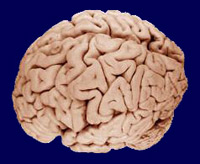
|
The brain is an incredibly complex system full of anatomical feedback pathways. For the most part, the feedback is negative, processing
information, regulating bodily functions, etc. Epileptic seizures spread through positive feedback.
|
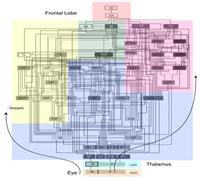
|
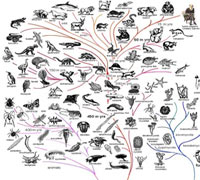
|
Natural selection is a dynamic process involving both kinds of feedback. When a random mutation gives an organism an advantage, it can reproduce dramatically and fill
a niche in only a few generations. All of the (much more common) random mutations that confer a disadvantage cause the organism to be eliminated by its competitors,
through negative feedback.
|
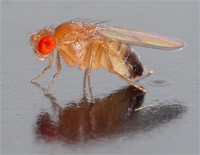
|
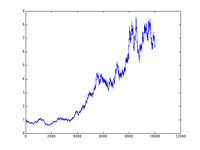
|
Stock markets and other financial systems are driven by positive feedback. When a stock price rises, more people want to invest in that stock, which
drives the price higher, drawing in even more buyers. Eventually, the stock price decreases, causing people to sell the stock, lowering the price further,
causing more people to sell.
|
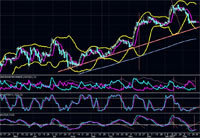
|
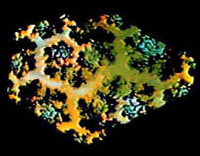
|
Video and audio feedback are electronic examples of positive feedback. When a guitar or microphone is held near a speaker, the signal is amplified over and over again,
resulting in a painful screech, or, if done carefully, a beautiful guitar tone. Video feedback involves pointing a video camera at a monitor, causing the signal to loop around and around,
forming beautiful fractal patterns.
|

|
Do not be confused by the direction of the action of the feedback. Positive feedback (through greed) drive up the price of a stock, and positive feedback (through fear) also drives
the price down. In other areas we talk about vicious circles, which are examples of positive feedback making a bad situation worse, and also of virtuous circles
which are cases where positive feedback makes a good situation better.
The key to remember is that positive feedback causes sytems to change, and negative feedback keeps the system stable.
When the level of oxygen in the blood drops too low, a signal in the brainstem triggers the lungs to breathe faster. What type of feedback is this? [ ___ ]
When the Quadratic Function Zn+1 = Zn2 + C is iterated for the value C=2, the values of Z are 0, 2, 6, 38, etc.
What type of feedback is this? [ ___ ]
|














